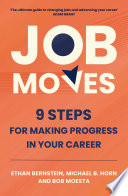

The book emphasizes the importance of recognizing and navigating career transitions effectively. It discusses how job moves are not just about changing positions but are pivotal moments that can define one’s career trajectory. The author provides frameworks for assessing when it’s the right time to make a move and how to prepare for the transition. This includes evaluating personal goals, market conditions, and potential opportunities. By understanding the underlying motivations for a job change—whether they are financial, personal growth, or work-life balance—readers can make informed decisions that align with their long-term career aspirations. The book also highlights the emotional aspects of job transitions, including the fear of the unknown and the excitement of new opportunities, providing strategies to cope with these feelings.
Continue readingJob Moves stresses the significance of networking in a successful career transition. The author argues that relationships are often more valuable than skills in the job market. The book provides practical advice on how to cultivate a robust professional network, including leveraging social media platforms like LinkedIn, attending industry conferences, and engaging in community events. It discusses the importance of building genuine connections rather than transactional relationships, emphasizing that a strong network can lead to job opportunities that are not publicly advertised. The author also shares stories of individuals who successfully navigated their careers through strategic networking, illustrating the transformative power of relationships in professional settings.
Continue readingAnother core idea in Job Moves is the necessity of continuous skill development. The book argues that the job market is constantly evolving, and staying relevant requires a commitment to lifelong learning. It encourages readers to identify skills that are in demand within their industry and to seek out opportunities for professional development, whether through formal education, online courses, or self-directed learning. The author provides a roadmap for creating a personalized learning plan that aligns with career goals, suggesting resources and strategies for acquiring new skills. This emphasis on adaptability and growth mindset is crucial for anyone looking to make successful job moves throughout their career.
Continue readingThe concept of personal branding is a significant focus in Job Moves. The author discusses how individuals can effectively market themselves to potential employers and the importance of having a clear personal brand that reflects one’s values, skills, and career aspirations. The book offers guidelines on how to create and maintain a personal brand across various platforms, including resumes, social media, and professional interactions. It also highlights the importance of authenticity in personal branding, encouraging readers to present their true selves rather than conforming to perceived industry standards. By establishing a strong personal brand, individuals can differentiate themselves in a competitive job market.
Continue readingJob Moves provides valuable insights into the process of evaluating job offers and negotiating terms. The author outlines key factors to consider when assessing an offer, such as salary, benefits, company culture, and growth opportunities. The book emphasizes the importance of being prepared to negotiate, providing strategies for effectively communicating one’s worth to potential employers. It discusses common pitfalls in negotiation and offers tips for achieving favorable outcomes without damaging relationships. This section is particularly useful for those who may feel uncomfortable discussing salary or benefits, empowering them to advocate for their needs confidently.
Continue readingThe book underscores the necessity of embracing change and developing resilience in the face of career challenges. The author shares personal anecdotes and research findings that illustrate how adaptability can lead to greater career satisfaction and success. It provides strategies for cultivating a resilient mindset, such as reframing negative experiences, seeking support from mentors, and maintaining a positive outlook. This focus on resilience is particularly relevant in today’s fast-paced job market, where changes are frequent, and the ability to pivot can make a significant difference in one’s career trajectory.
Continue readingFinally, Job Moves emphasizes the importance of strategic career planning. The author advocates for a proactive approach to career management, encouraging readers to set clear, achievable goals and regularly assess their progress. The book offers tools for creating a career roadmap, including identifying milestones and potential obstacles. By taking ownership of their career paths, individuals can better navigate job moves and make decisions that align with their long-term objectives. This strategic perspective is essential for anyone looking to build a fulfilling and successful career.
Continue readingThe reading time for Job Moves depends on the reader's pace. However, this concise book summary covers the 7 key ideas from Job Moves, allowing you to quickly understand the main concepts, insights, and practical applications in around 23 min.
Job Moves is definitely worth reading. The book covers essential topics including Understanding Career Transitions, Networking and Relationship Building, Skill Development and Lifelong Learning, providing practical insights and actionable advice. Whether you read the full book or our concise summary, Job Moves delivers valuable knowledge that can help you improve your understanding and apply these concepts in your personal or professional life.
Job Moves was written by Bob Moesta, Ethan Bernstein, Michael B. Horn.
If you enjoyed Job Moves by Bob Moesta, Ethan Bernstein, Michael B. Horn and want to explore similar topics or deepen your understanding, we highly recommend these related book summaries:
These books cover related themes, complementary concepts, and will help you build upon the knowledge gained from Job Moves. Each of these summaries provides concise insights that can further enhance your understanding and practical application of the ideas presented in Job Moves.